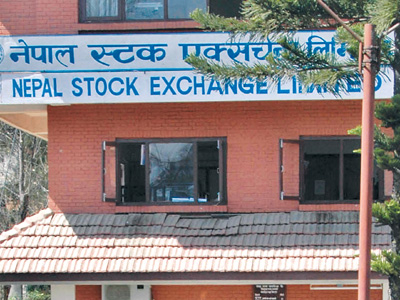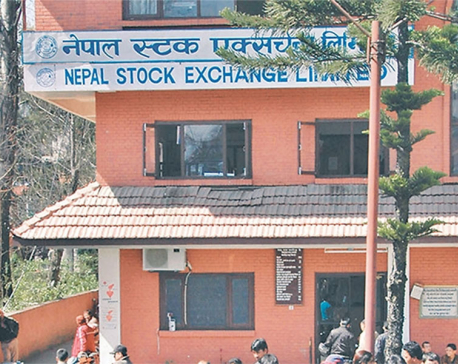
OR
Liquidity surplus drives daily share turnover to record high
Published On: June 13, 2016 03:39 AM NPT By: Republica | @RepublicaNepal
KATHMANDU, June 13: Nepal Stock Exchange (Nepse) recorded record high turnover of Rs 1.96 billion on Sunday as the bullish stock market continued to benefit from excess liquidity in banking system.
Average daily turnover of the stock market was around Rs 350 million last year.
The spectacular rise in turnover on Sunday is also due to bulk trading of promoter shares of some listed companies. With the full-fledged implementation of dematerialized form of share trading last year and rise is share price of almost all listed companies, daily turnover is also climbing up.
Experts say that investors are finding it beneficial to invest in the stock market rather than park their hard-earned money in bank and financial institutions (BFIs) who have been offering ultra-low interest rates. "Investment in shares generates more profit than saving money in the banks as the interest rates are so low now. This has encouraged many investors to come to the stock market," Anjan Raj Poudyal, former president of Stock Brokers Association of Nepal (SBAN), said.
Currently, depositors get average interest rate of 5.68 percent on fixed deposits.
"Also BFIs are offering loans to investors in very low interest rates now as they are sitting on a huge pile of loanable fund. Bank loans have become cheaper as well as easily accessible to investors. This is one of the major reasons why turnover is rising,” he added.
According to Nepal Rastra Bank (NRB), BFIs have extended a total of Rs 35 billion against share pledges in the first nine months of the current fiscal year, a jump by nearly Rs 11 billion compared to the corresponding period of the last fiscal year 2014/15. BFIs had floated a total of Rs 24 billion in margin lending in first nine months of the last fiscal year.
BFIs have been floating such loans at interest rate of 8 to 9 percent.
Modernization of share trading system has also helped to increase turnover to a large extent, according to analysts. "Earlier, it used to take a long time for an investor to either get the payment of the shares he sells or get the ownership he buys. Now investors get the payment within four days, increasing trading frequency," Poudyal added.
You May Like This

Average daily turnover in Nepse shoots up 26%
KATHMANDU, July 12: Average daily turnover at the Nepal Stock Exchange (Nepse) increased by nearly 26 percent in the current fiscal... Read More...

Bayern Munich announce record turnover
German champions Bayern Munich on Friday announced record turnover for the 2015-16 financial year of €627 million, up by more... Read More...

Single-day turnover in Nepse at record high of Rs 2.78 billion
KATHMANDU, July 27: Daily turnover in the stock market more than doubled to a record high of Rs 2.78 billion... Read More...




Just In
- MoHP cautions docs working in govt hospitals not to work in private ones
- Over 400,000 tourists visited Mustang by road last year
- 19 hydropower projects to be showcased at investment summit
- Global oil and gold prices surge as Israel retaliates against Iran
- Sajha Yatayat cancels CEO appointment process for lack of candidates
- Govt padlocks Nepal Scouts’ property illegally occupied by NC lawmaker Deepak Khadka
- FWEAN meets with President Paudel to solicit support for women entrepreneurship
- Koshi provincial assembly passes resolution motion calling for special session by majority votes







_20220508065243.jpg)






Leave A Comment